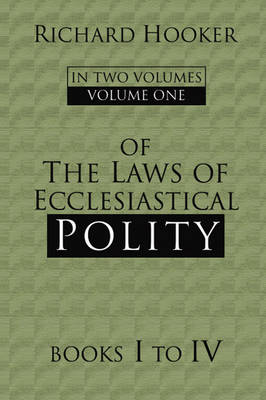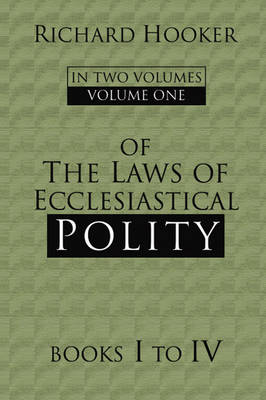
- Retrait gratuit dans votre magasin Club
- 7.000.000 titres dans notre catalogue
- Payer en toute sécurité
- Toujours un magasin près de chez vous
- Retrait gratuit dans votre magasin Club
- 7.000.0000 titres dans notre catalogue
- Payer en toute sécurité
- Toujours un magasin près de chez vous
Description
Volume One Although Richard Hooker was a representative Elizabethan in the scope of his mind and outlook, he so contrived to unite and hold in a real equilibrium a deep sympathy with the three great spiritual currents of his time, that those associating themselves with Low Church, High Church and Broad Church can all find themselves in Hooker's work today. It is a work that makes topical appeal with the attention now being paid to the work of the World Council of Churches, and the furtherance of the Ecumenical movement. Hooker's great Elizabethan guide to Church Government and Discipline is therefore both a masterpiece of English prose and one of the bulwarks fo the Established Church in England. Hooker projected eight books for the great work. The first four books of 'Ecclesiastical Polity' appeared in 1593, Book V in 1597. Hooker died in 1600 at the age of forty-six; the remaining three books were completed, though not revised, before his death. The manuscripts fell into careless or unscrupulous hands and were not published until long afterwards (1648 to 1662), and then only in mutilated form. There is an appendix containing Hooker's replies to his critics and a letter from George Crammer on the Discipline of the Church. Volume Two Although Richard Hooker was a representative Elizabethan in the scope of his mind and outlook, he so contrived to unite and hold in a real equilibrium a deep sympathy with the three great spiritual currents of his time, that those associating themselves with Low Church, High Church and Broad Church can all find themselves in Hooker's work today. It is a work that makes topical appeal with the attention now being paid to the work of the World Council of Churches, and the furtherance of the Ecumenical movement. This great Elizabethan guide to Church Government and Discipline is therefore both a masterpiece of English prose and one of the bulwarks of the established Church in England. Hooker projected eight books for the great work. The first four books of 'Ecclesiastical Polity' appeared in 1593, Book V in 1597. Hooker died in 1600 at the age of forty-six and the remaining three books were completed, though not revised, before his death. The manuscripts fell into careless or unscrupulous hands and were not published until long afterwards (1648 to 1662), and then only in mutilated form. There is an appendix containing Hooker's replies to his critics and a letter from George Crammer on the Discipline of the Church.
Spécifications
Parties prenantes
- Auteur(s) :
- Editeur:
Contenu
- Nombre de pages :
- 1004
- Langue:
- Anglais
Caractéristiques
- EAN:
- 9781592444243
- Date de parution :
- 08-12-03
- Format:
- Livre broché
- Format numérique:
- Trade paperback (VS)
- Dimensions :
- 131 mm x 202 mm
- Poids :
- 1038 g

Les avis
Nous publions uniquement les avis qui respectent les conditions requises. Consultez nos conditions pour les avis.






